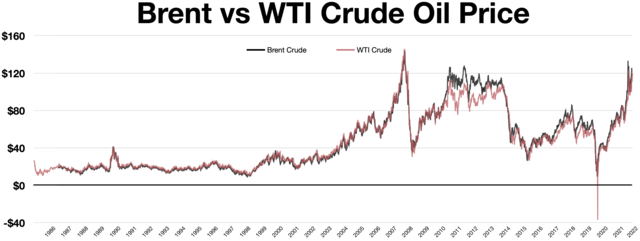The killer question is: can we really afford fossil fuels?

In our high-carbon economy, everything is dictated by the cost of oil and gas. From an economic point of view, this was fine and dandy when oil was cheap and its price relatively stable, but that all changed when the price surged in the early 2000s (see graph above). This in turn led to the 2008 financial crash when the cost of living (determined by the cost of oil/gas) surge burst the sub-prime mortgage bubble and brought the banking sector to its knees. And 14 years later, here we go again as surging prices are bringing economic trouble back to whack us all in the face, this time courtesy of Mr Putin.
Some are calling for more North Sea oil & gas, but why hasn’t the market already led to more exploitation? Time and time again over recent years, UK Chancellors have increased subsidies to that sector, so why isn’t they delivering? And is it not simply digging us deeper into the fossil fuel-shaped hole, making us even more vulnerable to the next crisis?
We often hear people from the right of politics ask “can we afford net zero?” Their perspective is dictated by the mindset that ‘saving the planet’ is simply woolly minded liberal virtue signalling, an outlook that requires some pretty Herculean levels of confirmation bias to dismiss both the scientific consensus and the increasingly obvious extreme weather. But even within that narrow economic worldview, the evidence suggests a high carbon economy is destined to failure given the volatility of oil prices has been with us for 20 years.
Unfortunately, given all infrastructure, economic incentives and, most importantly, mindsets are ranged against it, I don’t think the low carbon economy will rise fast enough through market forces alone to save us environmentally or economically. We need policy changes and fast, diverting cash and legislation away from high carbon into low carbon schemes.
An example: the UK Government recently announced £200 million to bring about “the golden age of cycling” – sounds a lot of dosh until you put it in the context of an annual roads budget of £12 billion. Given 68% of car journeys are less than 5 miles and 23% less than a mile, should this budget not be skewed towards active travel (walking/cycling)? Imagine the transformation you could make throwing a couple of billion at low carbon transport infra? But, as I’ve said many times before, the biggest barrier to Sustainability is just 6 inches wide – the space between our ears.
Image: https://en.wikipedia.org/wiki/File:Brent_vs_WTI_crude_oil.webp

